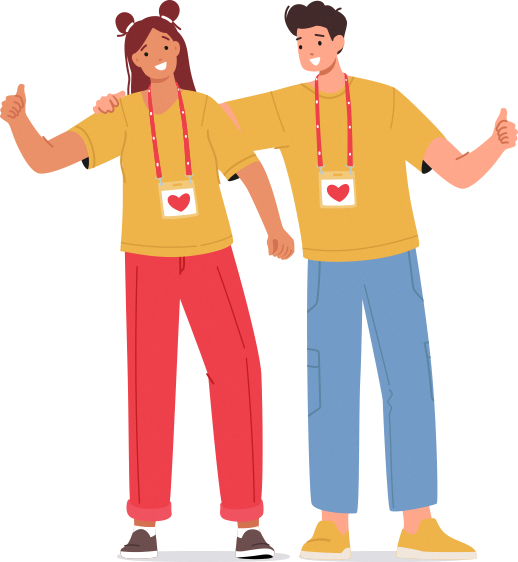Depending on the needs of your child, these partners can provide expertise and help to support your child’s journey towards recovery and improved well-being:
Counsellors
Counsellors provide counselling and can help develop healthy coping skills. They can guide your child on how to access resources and tap on support services for multifaceted issues. If needed, they will talk to family members or caregivers to provide your child with better support.
Counsellors

Clinical Psychologists
Clinical psychologists provide psychological assessments, diagnoses, and interventions for various mental health conditions. They also provide a safe space for your child to effectively address their mental health conditions, offering guidance and developing healthy coping skills.
If the clinical psychologist deems that medical treatment is needed, they can refer your child to a psychiatrist for further treatment.
Clinical Psychologists

General Practitioners (GPs) and Psychiatrists
General Practitioners (GPs) diagnose and work alongside other mental health professionals to manage individuals with mental and physical health conditions. To help better manage these conditions, they may refer those with high risk to other medical, psychiatry, and allied health services, if required.
Psychiatrists diagnose mental health conditions and manage its treatment, which may include prescribing medication if needed. They may also make referrals to psychologists for psychological interventions.
General Practitioners (GPs) and Psychiatrists

Social Workers
Social workers can assist your child and family in recognising social reasons for mental distress and support them through therapies.
They also provide low-income and vulnerable individuals and families with assistance through financial assessment and partner with other agencies to assist them with all their other needs.
Social Workers

What are some enhancements in public mental health services in Singapore?
In recent years, Singapore has made significant changes to enhance local mental health services.
These include:
-
Tiering services based on different levels of symptoms and needs
-
Increasing trained community mental health service providers
-
Making referrals across schools, community and healthcare smoother
Tiers for mental health services are:

Mental Well-being Promotion
Who will benefit?
Individuals with no or minimal mental health symptoms
Objective
To maintain mental well-being and prevent the development of mental health conditions
Examples of interventions/resources provided
-
School curriculum to build mental well-being and resilience
-
Public education and self-help (e.g. mindline.sg, MindSG, SG Mental Well-Being Network)
-
Parenting/ Peer/ Community support
-
Workplace mental well-being support

Low Intensity Services
Who will benefit?
Individuals with mild mental health symptoms
Objective
To facilitate coping and prevent the escalation of symptoms
Examples of interventions/resources provided
-
Mental health needs detection services
-
Counselling
-
Stress and anxiety management, social skills training, behaviour management

Moderate Intensity Services
Who will benefit?
Individuals with moderate mental health symptoms
Objective
To reduce the severity of symptoms
Examples of interventions/resources provided
-
Mental health assessment
-
Psychotherapy (e.g. Cognitive Behavioural Therapy)
-
Medical treatment

High Intensity Services
Who will benefit?
Individuals with severe mental health symptoms
Objective
To reduce the severity of symptoms and stabilise chronic mental health conditions
Examples of interventions/resources provided
-
Psychiatric assessment and diagnosis
-
Specialised and longer-term psychological interventions
-
Medical treatment
-
Emergency services
What are the different services available under the Tiered Care Model?
To meet the differing needs of those seeking mental health support, various mental health services of different intensities are available at each tier of the Tiered Care Model. These include counselling, psychotherapy, and specialist services.
Here are some differences across each of these services:

Type of service
Counselling
Service focus
Facilitating problem-solving and developing coping skills for issues individuals are currently facing, including:
-
Stress due to studies
-
Marital issues
-
Major life changes

Type of service
Psychotherapy
Service focus
Understanding and changing unhelpful patterns of thoughts, feelings, and behaviours to address specific mental health struggles and conditions

Type of service
Specialist Services
Service focus
Supporting individuals with more intensive mental health conditions for which counselling or psychotherapy alone may not be sufficient, including:
-
Psychiatric medicine
-
Rehabilitative services
-
Emergency services
Regardless of the mental health service offered, all service providers will tailor the intervention to meet each individual’s specific mental health needs.
Click here to find community mental health (CMH) services in Singapore via the CMH Wayfinding Tool. When you enter the website, click on the “Start now” button to explore suitable CMH services near you.
You can also find more mental health support services and schemes at SupportGoWhere. Using the Support Recommender on the SupportGoWhere website, you can also do a quick check to find services and schemes you and your child may be eligible for.


